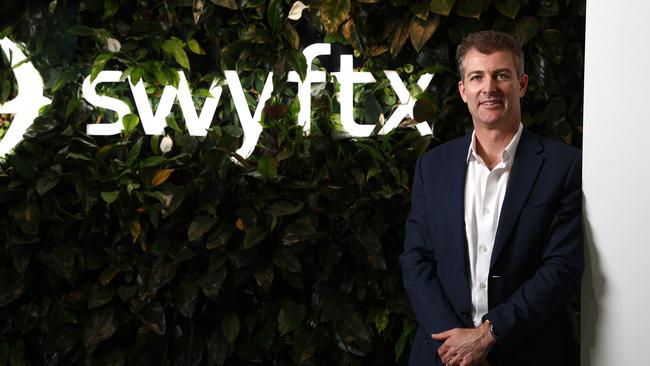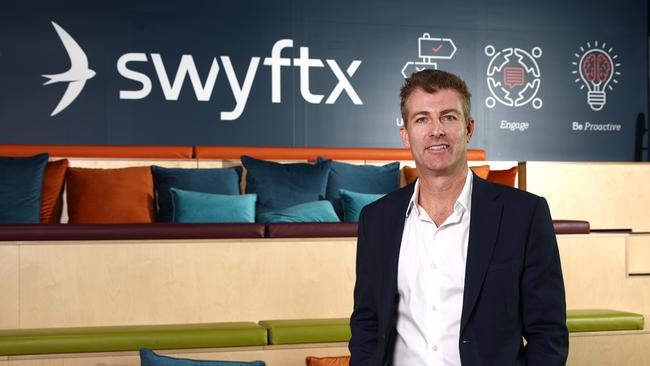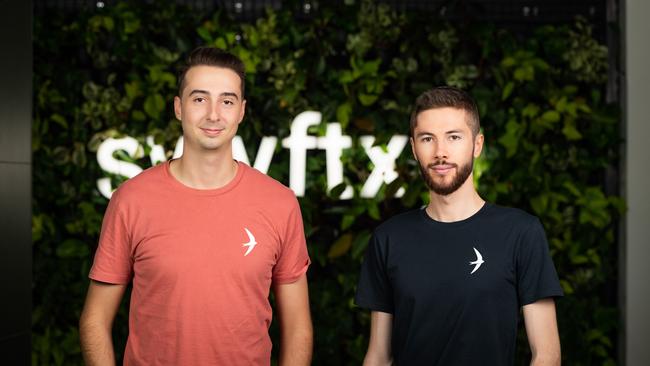Jason Titman takes the helm at crypto exchange giant Swyftx
Brisbane crypto exchange Swyftx with $3bn in customer funds under management and 122 staff has appointed a new CEO to take its growth to the next level.

QBW
Don't miss out on the headlines from QBW. Followed categories will be added to My News.
Jason Titman is not your typical flashy crypto entrepreneur.
The new 53-year-old chief executive of Brisbane crypto exchange Swyftx loves nothing more than swapping suit and tie for boots and Akubra to herd cattle at his weekend farm retreat.
Rockhampton-born Titman has been tasked with expanding and strengthening Swyftx, founded in a Brisbane bedroom in 2017 by crypto wunderkinds Angus Goldman and Alex Harper.
Swyftx has faced challenges in recent years, chiefly a failed merger in 2022 with rival Superhero to create a wealth management platform administering $1.5bn in cryptocurrency, direct equities and superannuation assets. During the period, Swyftx had to make half of its workforce redundant.
Titman’s career has spanned accountancy, hotel development and e-commerce, a resume he believes will help Swyftx as it moves beyond its start-up roots into the corporate big league.
In 2021, Titman was a senior executive at e-commerce exchange Neto when it was sold to MaroPost for $60m.
Born in the beef capital of Australia, Titman says he spends most of his downtime raising cattle on his farm in the Sunshine Coast hinterland.
“I had a grandfather who was a stud breeder for Brahman cattle, as well as having a mechanical business,” says the father of four.
“So I guess I’ve always loved cattle, and when I sold Neto, I was sort of trying to spend a bit more time with the family, so I bought a boat and a farm.”
Titman says he was originally brought in as an adviser to Swyftx, but ended up taking a full-time role as the sector moved from “hoodies to suits”.
“I really liked what Alex and Angus had done and what they had achieved,” says Titman. “Their vision was unlocking financial freedom for people, and I really resonated with the vision.”
Swyftx now has $3bn of customer funds under management, with cashed-up 45-year-old-plus males now some of the biggest traders, along with the younger generation.

The company is now eyeing expansion into overseas markets as part of its growth trajectory. “We are generating a lot of profit, so we’re in a healthy position for growth,” he says. “We’re certainly employing a lot more people, with 122 staff at the moment.”
Titman warns that big financial players are trying to make it difficult for companies such as Swyftx as new regulations loom.
“There’s an element of people just putting their heads in the sand and saying they don’t want to know about it (regulation),” he says. “But then there’s a commercial driver as well where the big banks want to know, how they are going to get a piece of it? It’s going from hoodies to suits, so it’s probably a little bit like my journey.”
One regulation proposal being considered by the Albanese government will require digital asset platforms that hold over a certain threshold of Australians assets to obtain an Australian Financial Services Licence. The government also is looking at standards covering platform contracts, holding tokens, custody software and transacting in tokens.
Titman stresses that regulation, which may pave the way for big super funds and other institutional investors to buy into the sector, needed to encourage innovation rather than stymie it.
“There are still operators in the industry that don’t see the need for regulation,” he says. “But I think any of the responsible operators definitely do understand that’s where we’re going. It’s important, and I’ve been stressing to the government that you can have the tightest regulation in the world, but be very careful what you wish for, because you won’t have the best digital assets and blockchain industry in the world. You’ll kill it, you’ll kill the innovation.”
Titman sees his role as helping Swyftx balance innovation with traditional financial knowledge.
“I understand the importance of having the new, digitally savvy generation coming through, but you’ve got to be able to kind of blend that with the way in which business needs to be done, particularly as we move into a regulated environment,” he says.
He says the founders built a great company and are continuing to provide guidance on the board as executive directors.

“But we also want people with some deep knowledge of traditional finance,” he says. “We don’t want a pinstripe banking mentality because that will kill the industry, but for me there’s finding the sweet spot. My background includes being an investor in a lot of venture capital-style companies, particularly over the last 15 years. It’s kind of kept me aware of what Swyftx needs. From a cultural perspective, you’ve got to grow up, but you’ve got to be careful, don’t grow up too quickly. And you lose everything. You lose the core competency and the competitive advantage.”
Titman expects to see a collection of cryptocurrencies, known as stable coins, replacing traditional cash, both for investment and trading. Stablecoins are cryptocurrencies whose values are pegged, or tied, to that of another currency, commodity, or financial instrument.
“Cash has dropped by about 27 per cent since Covid, and it hasn’t come back,” he says. “I think the reality of it is we are on the downward trend of physical cash being utilised for a whole range of reasons. There is a growing consensus that the US dollar will eventually be debased as the international exchange currency for trade. So the blockchain and the cryptocurrencies are challenging governments and challenging the US.”
He says cryptocurrency remains in its infancy, and he didn’t “think any of us really understand how big it could be”. “The question is how do we start to build a global footprint,” Titman says. “It has come from nowhere in the last five years, and there is a definite pent-up demand from consumers around the world. In Australia, there is $3 trillion in superannuation funds.”
He says the nervousness that is being created by the lack of regulation is not helping. “There is intentional scare mongering from traditional institutions that know their business model is at risk. The banks are still producing an incredible amount of profit, despite the fact they’ve had mortgage brokers and all of these people trying to chew away at them.”





